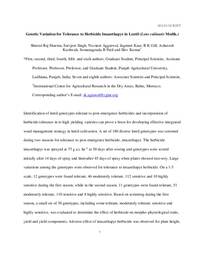Genetic Variation for Tolerance to Herbicide Imazethapyr in Lentil (Lens culinaris Medik.)

Authors:
Identification of lentil genotypes tolerant to post-emergence herbicides and incorporation of herbicide tolerance in to high yielding varieties can prove a boon for developing effective integrated weed management strategy in lentil cultivation. A set of 180 diverse lentil genotypes was screened during two seasons for tolerance to post-emergence herbicide, imazethapyr. The herbicide imazethapyr was sprayed at 75 g a.i. ha−1 at 50 days after sowing and genotypes were scored initially after 14 days of spray and thereafter 45 days of spray when plants showed recovery. Large
variations among the genotypes were observed for tolerance to imazethapyr herbicide. On a 1-5 scale, 12 genotypes were found tolerant, 46 moderately tolerant, 112 sensitive and 10 highly sensitive during the first season, while in the second season, 11 genotypes were found tolerant, 51 moderately tolerant, 110 sensitive and 8 highly sensitive. Based on screening during the first season, a small set of 30 genotypes, including some tolerant, moderately tolerant, sensitive and highly sensitive, was evaluated to determine the effect of herbicide on morpho-physiological traits, yield and yield components. Adverse effect of imazethapyr herbicide was observed for plant height, 2 days to 50% flowering and pod initiation, biomass accumulation, leaf area index, specific leaf weight, crop growth rate, chlorophyll content, 100-seed weight, pods plant-1 and seed yield when compared to control (unsprayed). Tolerant genotypes showed less reduction for most of the morpho-physiological traits, yield components and yield. Five genotypes namely LL699, LL1397, IPL406, EC78452 and LL1203 demonstrated higher herbicide tolerance with less adverse effect on various morpho-physiological traits and recorded less reduction (<19%) for seed yield in imazethapyr treated plots as compared to control. These genotypes can be used in breeding programme for developing post-emergence herbicide tolerant cultivars and for genetic studies. The development of improved herbicide tolerance is critical to improving weed control in lentil, and expanding lentil production into new areas to support the practice conservation agriculture. Nomenclature: Imazethapyr; lentil, Lens culinaris Medik.
